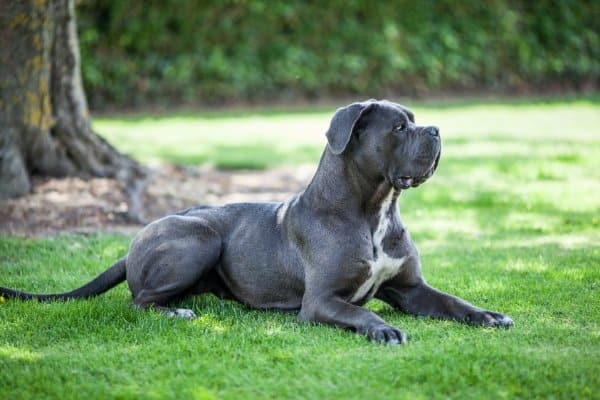A Cane Corso has an imposing presence, a dignified air, and an intimidating appearance. With a massive head, powerful jaws, and an impressive weight of often more than 120 pounds, there is no doubt that a Cane Corso is both large and strong enough to handle the role of guard dog. This begs the question…
Are Cane Corsi naturally protective? Yes. Cane Corsi were created to be courageous, powerful protectors of both the family and the home. This breed shows amazing judgment in discerning true threats and won’t hesitate to use the proper amount of force to get the job done.
Cane Corsi owners often jokingly say that owning one of these dogs is like having a gun… with a brain. A slight exaggeration? Perhaps, but it speaks volumes as to their guarding abilities.
Let’s take a closer look at why they are naturally protective and gain a deeper understanding of what owning this breed actually involves.
Are Cane Corsi Naturally Protective and Are They Good Guard Dogs?
Some dogs need extensive, professional training in order to become a reliable guard dog and personal protector. This is not the case with the Cane Corso. While a few may need professional training to fine-tune their ability, for most Cane Corsi, the instinct to guard and protect comes naturally.
While it is true that Cane Corsi are rather cool, calm, and collected most of the time, are gentle and incredibly loyal to their family, and are even tolerant and patient with “their” children, they are also very alert and attuned to their surroundings.
The ability to detect the slightest hint of danger before it becomes a direct threat to their family or property and the willingness to defend those they love, coupled with courage not known to many other breeds is what truly sets the Cane Corso apart from the crowd.
These attributes were intentionally bred into these formidable dogs long ago, and well-bred Cane Corsi today still exhibit that natural protective nature and instinct to guard. To better understand these deeply ingrained attributes, it’s worthwhile to take a quick glimpse at the breed’s history.
A Brief History
Many years ago in ancient Greece, there was a tribe known as the Molossi who purposely bred giant, heavy-boned, Mastiff-type dogs to guard their homes, families, flocks, and herds. These Molossers, as they came to be known, were highly prized for their fierceness, bravery, and legendary loyalty.
While these Molossers were exceptional, ultimately the area fell under the control of the Roman Empire. Italian soldiers brought some of these massive guard dogs back to Italy, and by interbreeding with native Italian breeds, eventually created two distinct breeds, the Cane Corso and the Neopolitan Mastiff.
In Latin, the word for dog is canis, and in Italian, cane, so it’s pretty clear where the Cane Corso gets the first half of his name. What about Corso? Several theories exist, but the most widely accepted is that the word is a derivation of the Latin cohors, meaning bodyguard. So, this dog’s name literally translates to “guard dog.”
It’s clear that these dogs were originally bred to protect and guard their home, family, and property and that they were named for what they were bred to do – guard.
Is it safe to say that Cane Corsi are naturally protective? Absolutely.
Do Cane Corsi perform well as guard dogs? Most definitely.
Do Cane Corsi Need to Be Trained?
Most Cane Corsi will begin to show protective behavior around the time they reach their first birthday, and by the time they reach 14 – 18 months or so, guarding and protecting instincts are usually quite developed.
In most instances, there is no need to train these natural guards to watch vigilantly over their surroundings and willingly protect what is “theirs.” It just comes naturally.
Some Cane Corsi, due to poor breeding or handling, may require some additional guidance to properly channel their natural guarding instincts, but unless you are extremely familiar with the breed, this is best left to a professional who has experience with Cane Corsi.
A Word of Caution: Not all Cane Corsi breeders are equal. Many lack a deep understanding of the breed and the importance of breeding for correct temperament. Their puppies are much more likely to have unstable temperaments and with each litter produced, a definite drifting away from correct, classic Cane Corso temperament and conformation standards is evident. Research all potential breeders carefully before purchasing. We have an article here to guide you through the process.
Now, what about regular training? Basic obedience and command training is essential. While it’s always nice for a dog to sit and stay whenever you tell them to, with a breed as powerful as Cane Corso, obedience is not optional.
With this breed, basic training involves more than just teaching a few commands. Much more. In fact, it’s often said that because of the dedication required with a Cane Corso, this breed is more like a hobby than a pet.
Cane Corsi training is more about teaching the dog to understand and respect that you are in charge, the leader of the pack, the alpha member, the head honcho, whatever you choose to call it, and this fact is absolutely non-negotiable. Period.
The Importance of Socialization
We all know that early socialization is important for any dog. It helps them grow up to be confident, well-rounded adults who will respond appropriately in a wide variety of circumstances.
With a naturally protective breed like the Cane Corso, who has the potential to cause serious damage, the importance of early, correct, thorough socialization can not be overemphasized.
You see, a Cane Corso needs to understand what is normal and what is cause for alarm in order to be an effective, reliable guard dog. This can only be accomplished through socialization. He must understand that, for example, it’s perfectly fine for the neighbor’s children to run around in the yard shrieking as they play.
A Cane Corso that hasn’t been exposed to many different people, animals, scents, sounds, and experiences might assume that because he’s not familiar with it, it must be a threat and should be dealt with accordingly – an absolute recipe for disaster (and possibly a lawsuit as well).
All too often, you hear about these beautiful animals being put down because they attacked a perceived threat. In almost all cases, the tragic story could have been avoided if the owners had taken the necessary steps to be certain that the dog was well socialized and would only attack a real, legitimate threat.
Will a Cane Corso Attack an Intruder?
The beauty of this magnificent breed is his innate ability to read and assess a situation and then respond appropriately. When properly socialized, a Cane Corso has an incredibly discerning nature and can sense when someone approaches with bad intentions.
A quick internet search yields story after story of Cane Corsi chasing away potential intruders, often leaving behind a trail of the suspect’s blood to point police in the right direction, and then calmly returning home where they belong, mission accomplished.
They are well known for swiftly eliminating potential threats to their family and territory by attacking if need be, chasing the intruder well away from the property, and then immediately returning to the family’s side moments later when the area is safe and secure, all done with impressive efficiency.
Are Cane Corsi Naturally Aggressive?
Well, if you happen to be an intruder or wish to inflict harm on a Cane Corso’s family, then without a doubt, the answer is a resounding yes. This breed is naturally aggressive when it comes to guarding their home and protecting their family, and their effectiveness in getting the job done is unrivaled.
However, in everyday situations, a Cane Corso should be reliably gentle with an even temperament, loving, trustworthy, calm, and sociable at home but ready to spring into action the instant the need arises. This is one of the many reasons that the Cane Corso is so highly regarded and respected as a protection dog.
Image Credit: Steve C





